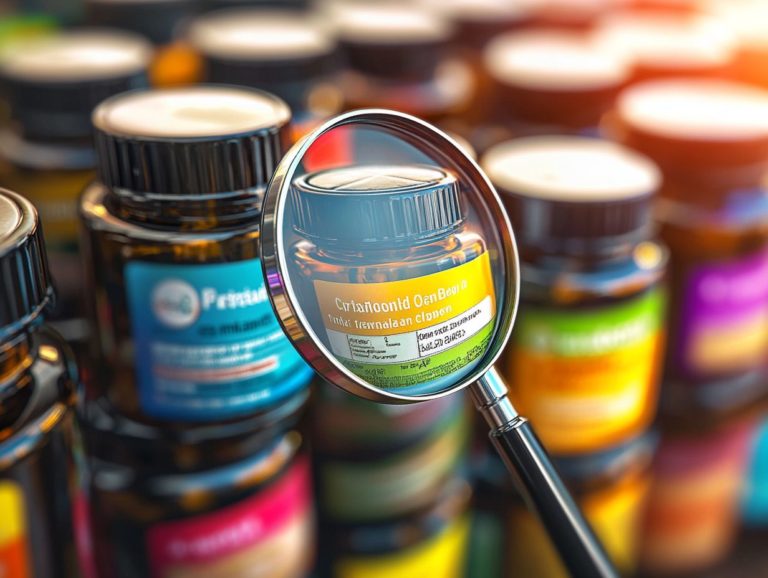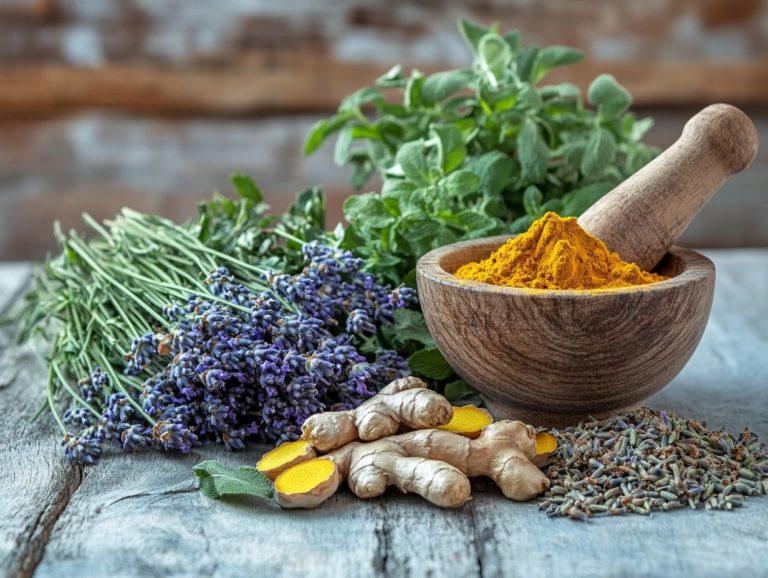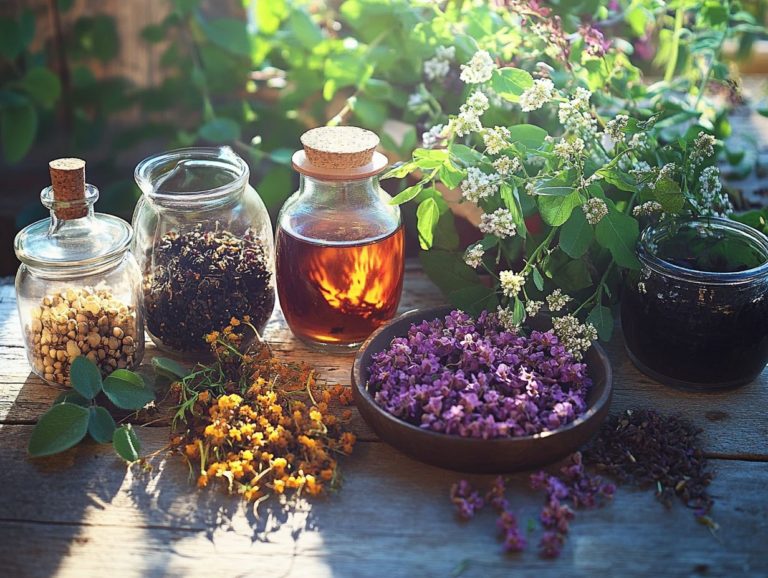What Are Common Herbal Remedies for Headaches?
Headaches can be a common yet frustrating experience. They often leave you in search of relief. Herbal remedies, including herbal supplements, have emerged as a preferred, natural alternative to conventional medications. They offer potential benefits without the unwanted side effects.
This article covers various types of headaches migraines, tension headaches, and cluster headaches. It explores the various herbal options available for alleviation, provides insights on how to prepare and use these remedies safely, and highlights essential precautions to keep in mind, particularly concerning dietary triggers that may exacerbate your condition.
You’ll learn when it s crucial to seek medical advice for persistent headaches. This knowledge empowers you to adopt a holistic approach to managing your discomfort with herbal solutions, especially in relation to chronic migraine.
Contents
Key Takeaways:
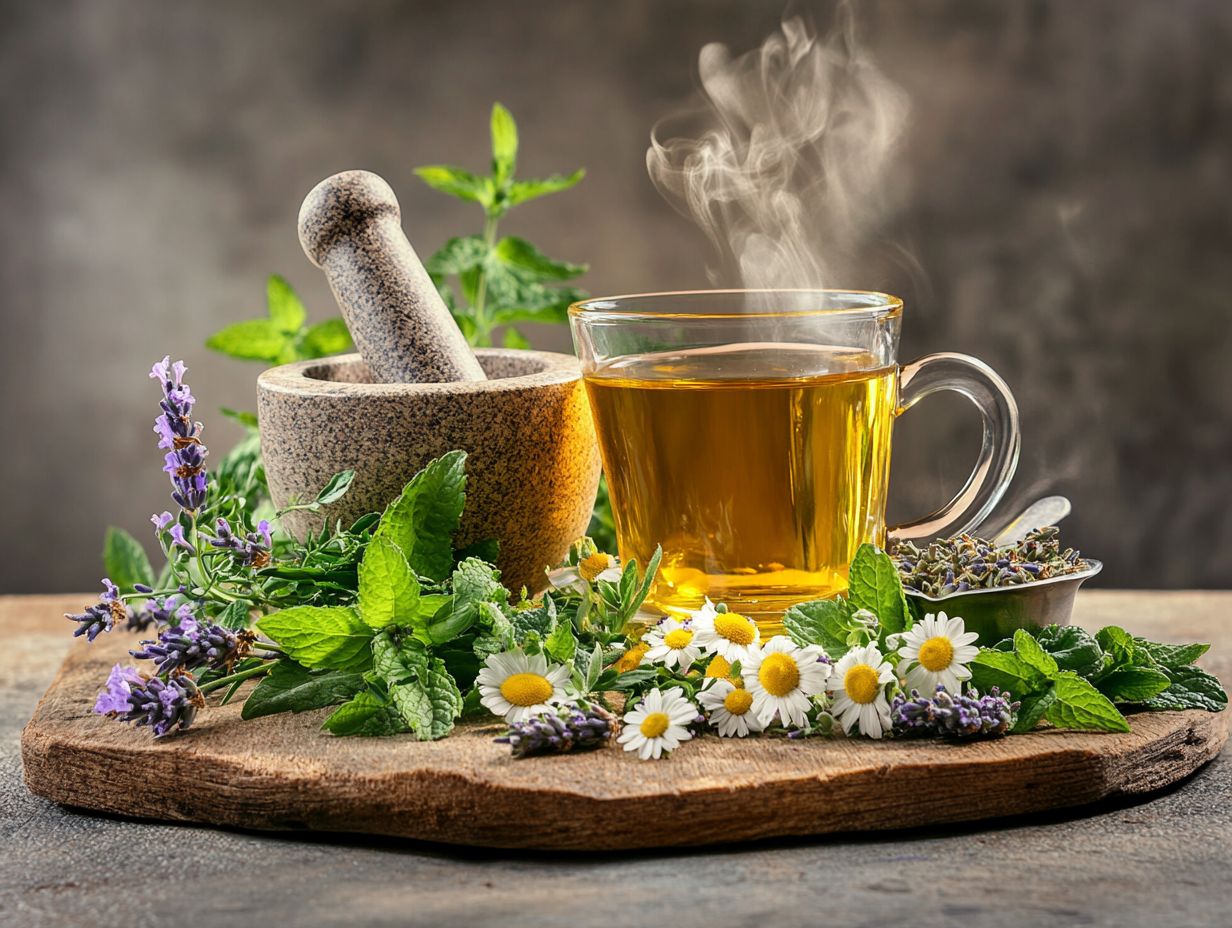
- Herbal remedies can be effective in treating headaches, but it is important to correctly identify the type of headache before using them, especially in cases of chronic migraine.
- Some commonly used herbs for headaches include peppermint, feverfew, ginger, and butterbur. These herbs can help alleviate pain and reduce inflammation.
- When using herbal remedies, it is important to follow proper preparation and administration methods and to be aware of potential side effects and drug interactions. Always consult a doctor for serious or persistent headaches.
What Are Herbal Remedies?
Herbal remedies are your gateway to natural treatments derived from plants that have stood the test of time, addressing a variety of ailments, including migraine and tension headaches. Picture botanicals like butterbur, feverfew, ginger, and valerian. These powerhouses have shown real potential in providing pain relief and alleviating headache symptoms.
Many individuals turn to herbs for reducing headaches and migraines not only for their effectiveness but also for their perceived safety compared to pharmaceuticals. This makes them a favored option for those grappling with chronic migraines and other headache types.
Throughout history, herbal remedies have effectively managed pain, playing a vital role in traditional medicine across cultures. Butterbur, with its impressive anti-inflammatory properties, is often suggested for migraine prevention, while feverfew has long been celebrated for its ability to reduce the frequency and intensity of these headaches.
Ginger is your ally against nausea, which often tags along with headaches. Meanwhile, valerian not only soothes with its sedative effects but also helps in alleviating stress-related tension headaches.
These herbs are versatile and available in various forms such as teas, capsules, essential oils, or tinctures, each crafted to effectively and naturally target specific headache types.
Types of Headaches
Headaches come in various forms, each with its own unique characteristics, triggers, and treatment options. The most prevalent types migraines, tension headaches, and cluster headaches can have a profound effect on your daily life.
Migraines, for instance, can be very severe, often accompanied by symptoms such as nausea and sensitivity to light. On the other hand, tension headaches typically manifest as a dull, aching pain, often stemming from stress or muscle tension.
Grasping the distinctions among these types is essential for effective management and treatment. This understanding gives you the power to take control of your well-being, including the role of magnesium a mineral that helps prevent headaches.
Take control of your health today with natural solutions for your headaches!
Identifying Migraines, Tension, and Cluster Headaches
Identifying the type of headache you re experiencing is crucial for effective treatment and pain relief, particularly when considering the distinct symptoms of migraines, tension headaches, and cluster headaches.
Understanding the nuances of these conditions gives you the power to communicate your symptoms more effectively to healthcare providers. For example, migraines don t just come with debilitating throbbing pain; they can also provoke additional symptoms like nausea, vomiting, and severe sensitivity to light and sound, leaving you incapacitated for hours or even days.
Tension headaches vary in intensity but generally lack nausea. They come from muscle tension, and you can often find relief with relaxation techniques or over-the-counter medications.
If you re dealing with cluster headaches, you might notice a burning sensation and episodes that coincide with specific seasons. These headaches necessitate prompt medical attention due to their severity and recurrence, especially if your condition is linked to dietary triggers or stress.
Herbal Remedies for Headaches
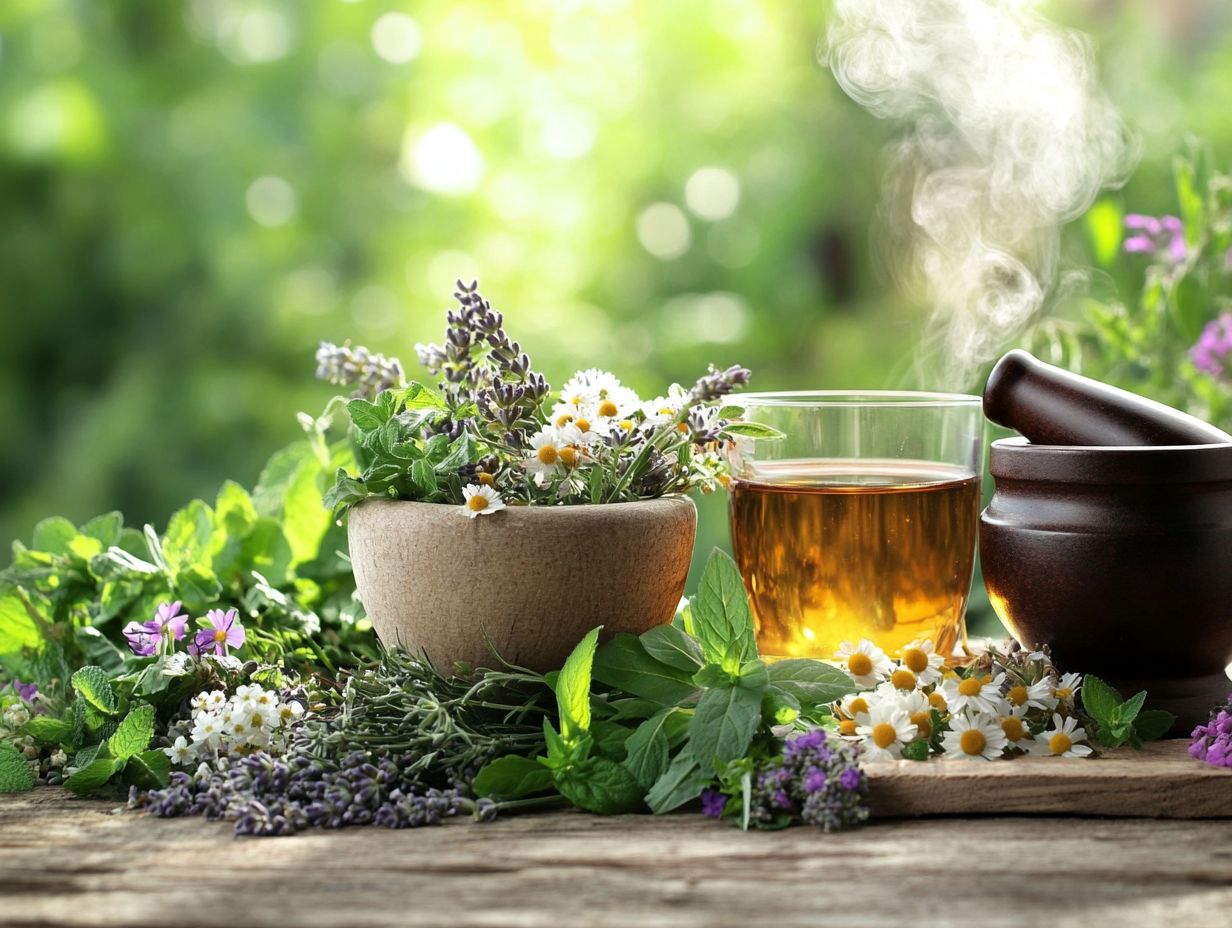
Herbal remedies, including herbal supplements, have become increasingly sought after as natural alternatives for headache relief, with various herbs showing promise in alleviating symptoms linked to migraines and other headache types.
Botanicals like butterbur and feverfew are proven to reduce the frequency and intensity of migraines. Ginger, known for its soothing properties, can effectively combat headache pain.
Herbs like valerian and peppermint provide calming effects and promote muscle relaxation, enhancing the overall experience of headache relief, particularly for tension headaches.
Commonly Used Herbs and Their Effects
Several herbs, including butterbur, feverfew, and ginger, serve as natural remedies for headaches, each with unique properties that can help alleviate your symptoms.
Among these, butterbur stands out, with clinical studies showing that its extracts can significantly reduce the frequency of migraines. Feverfew is another option, known for its anti-inflammatory compounds that may lessen both the intensity and duration of pain. Additionally, you might explore the most effective herbal remedies for nausea for further relief options.
If you’re prone to nausea during migraine attacks, ginger deserves your attention; its gingerol compounds work wonders to ease gastrointestinal discomfort. Additionally, peppermint can be applied topically as essential oil or diluted tinctures, providing a soothing cooling sensation that effectively alleviates tension headaches. For those seeking further relief, consider exploring natural remedies for migraines.
Preparation methods can vary, with herbal teas being a popular choice for extracting beneficial properties, while capsules and essential oils offer convenient options for those on the move. By understanding how to weave these herbs into your daily routine, including the use of magnesium and linden, you can take control of headache relief in a natural and effective way, utilizing easy DIY herbal remedies for headaches.
How to Use Herbal Remedies for Headaches
Using herbal remedies requires a thoughtful approach. Options like teas, tinctures, capsules, and essential oils offer unique benefits based on your preferences and the specific type of headache.
For example, applying peppermint essential oil directly to your temples can provide immediate relief, while ingesting butterbur supplements may yield more gradual, systemic benefits over time.
Take control of your headache relief naturally. Explore these herbal options today!
Methods of Preparation and Administration
There are several effective methods for preparing and using herbal remedies specifically targeting migraines and headaches. You can choose options that align with your lifestyle and preferences. Common preparation methods include:
- brewing soothing teas from dried herbs like ginger and peppermint,
- creating tinctures for more concentrated dosages,
- utilizing essential oils for topical application.
Each method offers unique benefits and can be tailored to your specific symptoms, such as stress or nausea, or your desire for immediate or long-lasting relief.
Brewing herbal teas can calm you. The warmth of the liquid often aids in relaxation.
Just keep in mind to follow the recommended dosages usually one to two cups a day to avoid any potential digestive discomfort.
Tinctures come in alcohol or glycerin and need careful dosing generally between 20 to 30 drops. Don t underestimate their potency, as they can deliver rapid effects.
Essential oils provide another quick relief option and can be applied topically with a carrier oil, which is a neutral oil used to dilute essential oils. Remember to perform a patch test first to prevent any skin irritation.
By understanding these ways to use herbal remedies, including willow bark and ginkgo biloba, you can enhance your well-being safely and maximize their efficacy.
Safety and Side Effects of Herbal Remedies
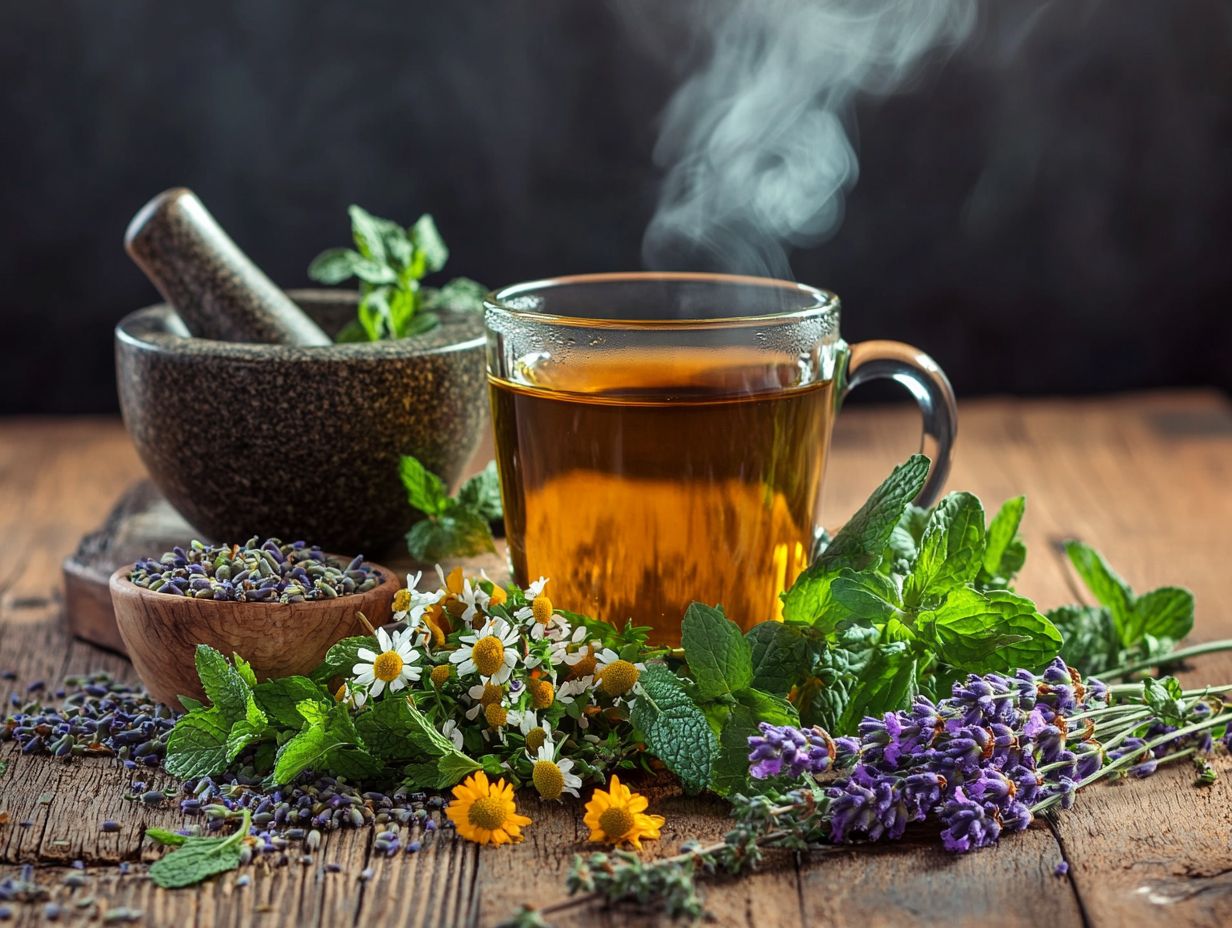
Herbal remedies offer an exciting, natural way to tackle headaches! However, it’s crucial to consider their safety and potential side effects, particularly when dealing with migraines and chronic headaches. Not every herb is suitable for everyone, and some may interact with medications or lead to adverse effects.
For instance, butterbur has been associated with liver toxicity in certain formulations. This underscores the importance of sourcing your herbs from reputable suppliers and consulting healthcare professionals before incorporating them into your regimen. Your health matters. Always choose wisely!
Considerations and Precautions
When considering herbal remedies for headaches, it s important to take several precautions to ensure safe and effective use, especially if you re dealing with migraines. Know your health, allergies, and possible side effects before incorporating any herbal treatment.
If you re pregnant or breastfeeding, consulting a healthcare provider is essential before using remedies like feverfew or ginger, as their effects on these populations might not be well researched.
You should also review your current medications. Certain herbal products may interact negatively with them especially blood thinners or medications that affect blood pressure.
To choose quality herbal remedies, look for products certified by reputable organizations to ensure their safety and efficacy. Reading labels for ingredients and recommended dosages is essential; taking too much can lead to unwanted side effects.
Consulting a qualified practitioner, particularly one who specializes in integrative medicine, can provide personalized guidance tailored to your health history, leading to more well-considered choices.
When to Seek Medical Attention
Recognizing when to seek medical attention for headaches is essential, especially in the case of migraines or when you encounter serious symptoms that could hint at an underlying health issue.
If your headaches come with severe pain that refuses to budge despite treatment, visual disturbances, confusion, or notable changes in your personality, don t wait! It s vital to consult a healthcare provider immediately.
Chronic migraines can greatly affect your quality of life, and timely medical intervention may open up additional management options that can make a significant difference.
Explore herbal remedies while prioritizing your safety and well-being!
Signs of a Serious Headache and When to Consult a Doctor
Recognizing signs of a serious headache is crucial. Quick action can make all the difference. Serious symptoms might include a sudden onset of severe pain, changes in vision, weakness, difficulty speaking, or pain accompanied by fever or a stiff neck.
Don t wait to consult a healthcare provider! Recognizing these warning signs can help save your life. Describe the type and frequency of your headaches, along with any accompanying symptoms. This detailed account will assist the provider in determining if imaging tests or other diagnostic procedures like scans are necessary.
Keeping a headache diary can also be beneficial. Tracking what causes headaches, their duration, and intensity provides valuable insight for effective treatment planning. Understanding these steps ensures your concerns about headaches are taken seriously and addressed promptly.
Frequently Asked Questions
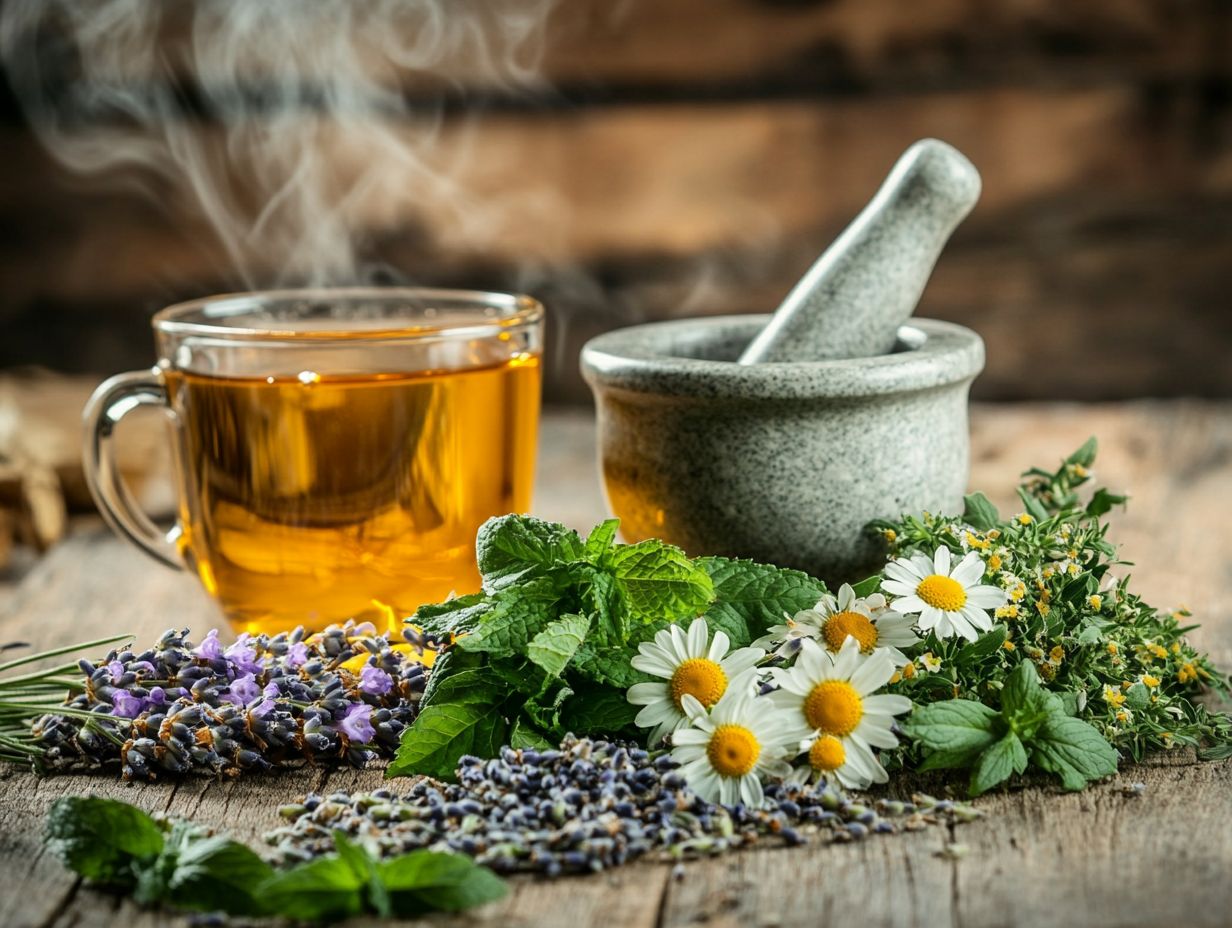
What Are Common Herbal Remedies for Headaches?
Several herbal remedies have been used for centuries to treat headaches. Some of the most common include feverfew, butterbur, ginger, peppermint, and willow bark.
How Does Feverfew Help with Headaches?
Feverfew contains compounds that may help reduce inflammation and blood vessel constriction, both of which can contribute to headaches. It is often used to prevent migraines and tension headaches.
Can Butterbur Really Relieve Headaches?
Butterbur has shown anti-inflammatory effects, which can help with headaches. It may also work similarly to certain prescription medications for migraines.
Why Is Ginger a Popular Choice for Headaches?
Ginger has been used for centuries for its medicinal properties, including its ability to reduce inflammation and pain. It may be helpful for headaches caused by tension or sinus pressure.
What Is Peppermint Commonly Used For in Regards to Headaches?
Peppermint has a cooling effect and contains menthol, which can help soothe headaches. It may also calm the nervous system, making it helpful for stress-related headaches.
Is Willow Bark Similar to Aspirin?
Yes, willow bark contains a compound called salicin, which is similar to the active ingredient in aspirin. It has been used for centuries to relieve pain and inflammation, including headaches.



